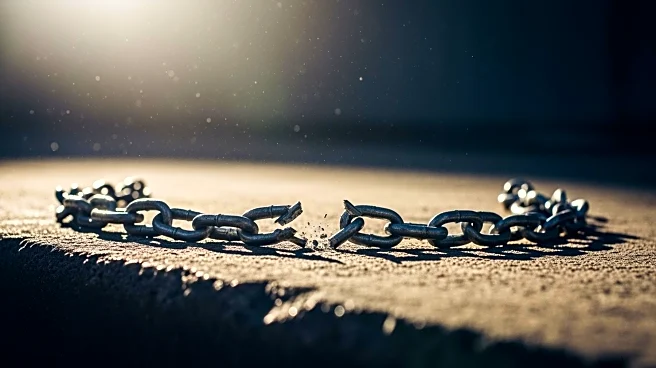What's Happening?
The Israeli Security Cabinet has confirmed the identity of the tenth deceased hostage, Eliyahu Margalit, whose body was returned from Gaza. This development comes as part of a ceasefire agreement between
Israel and Hamas, which has been in effect for a week. The Red Cross facilitated the transfer of Margalit's body to Israeli authorities. Despite this progress, there are still 18 deceased hostages whose bodies remain in Gaza, leading to growing frustration in Israel. Hamas claims it has handed over all accessible remains, but Israeli intelligence suggests that Hamas may know the locations of some of the missing bodies. The ceasefire, while holding, is under strain due to these unresolved issues and other incidents, such as the killing of a Palestinian family by Israeli forces, which Hamas claims violates the ceasefire.
Why It's Important?
The identification and return of hostages' bodies are critical to maintaining the fragile ceasefire between Israel and Hamas. The delay in returning all bodies could exacerbate tensions and potentially lead to a breakdown in the ceasefire. This situation impacts not only the families of the hostages but also the broader geopolitical stability in the region. The ongoing negotiations in Egypt regarding the future governance of Gaza and the potential involvement of an International Stabilization Force highlight the complexity of achieving lasting peace. The outcome of these negotiations could significantly influence regional politics and security dynamics.
What's Next?
Negotiations are ongoing in Egypt to address the next phases of the ceasefire agreement, including the demilitarization of Gaza and the establishment of a governance structure. The involvement of an International Stabilization Force is being considered, with discussions about its composition and mandate. The successful implementation of these plans could lead to a more stable and peaceful Gaza, but the process is fraught with challenges, including Hamas's stance on disarmament and the logistics of international involvement.
Beyond the Headlines
The situation underscores the ethical and humanitarian challenges in conflict zones, where the return of deceased individuals becomes a point of negotiation. The role of international organizations like the Red Cross in facilitating such exchanges highlights the importance of neutral parties in conflict resolution. Additionally, the potential establishment of a non-political governance structure in Gaza could set a precedent for conflict resolution in other regions.










